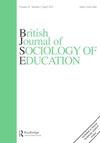Rethinking causality and inequality in students’ degree outcomes
IF 2.1
3区 教育学
Q1 EDUCATION & EDUCATIONAL RESEARCH
引用次数: 0
Abstract
Abstract Inequality in students’ degree outcomes has been a concern for the higher education sector and the UK government for more than a decade. Since its inception in 2018, the Office for Students in England has prioritised the need for evidence of causality through requiring institutions to evaluate the effectiveness of their initiatives as set out in Access and Participation Plans. This policy development responds to several reports which identify a dearth of evidence-based interventions and scant knowledge of ‘what works’. This paper traces the interplay between policy and research, focusing on the assumptions they make about causality. It concludes that unwarranted positions are taken in both spheres of practice, making progress unlikely. A conception of causality situated in extant formal theory on evidential pluralism and that draws on current practices would help us address inequality more effectively. Alternative framings of the problem of inequality in students’ degree outcomes is offered.重新思考学生学位结果的因果关系和不平等
摘要十多年来,学生学位成绩的不平等一直是高等教育部门和英国政府关注的问题。自2018年成立以来,英国学生办公室一直优先考虑因果关系证据的需要,要求各机构评估其在入学和参与计划中规定的举措的有效性。这一政策发展回应了几份报告,这些报告指出缺乏循证干预措施,对“什么有效”知之甚少。本文追溯了政策和研究之间的相互作用,重点是他们对因果关系的假设。它的结论是,在这两个实践领域都采取了不合理的立场,不太可能取得进展。因果关系的概念位于现有的证据多元主义形式理论中,并借鉴当前的实践,将有助于我们更有效地解决不平等问题。提供了学生学位成果不平等问题的替代框架。
本文章由计算机程序翻译,如有差异,请以英文原文为准。
求助全文
约1分钟内获得全文
求助全文
来源期刊
CiteScore
3.70
自引率
9.50%
发文量
74
期刊介绍:
British Journal of Sociology of Education is one of the most renowned international scholarly journals in the field. The journal publishes high quality original, theoretically informed analyses of the relationship between education and society, and has an outstanding record of addressing major global debates about the social significance and impact of educational policy, provision, processes and practice in many countries around the world. The journal engages with a diverse range of contemporary and emergent social theories along with a wide range of methodological approaches. Articles investigate the discursive politics of education, social stratification and mobility, the social dimensions of all aspects of pedagogy and the curriculum, and the experiences of all those involved, from the most privileged to the most disadvantaged. The vitality of the journal is sustained by its commitment to offer independent, critical evaluations of the ways in which education interfaces with local, national, regional and global developments, contexts and agendas in all phases of formal and informal education. Contributions are expected to take into account the wide international readership of British Journal of Sociology of Education, and exhibit knowledge of previously published articles in the field. Submissions should be well located within sociological theory, and should not only be rigorous and reflexive methodologically, but also offer original insights to educational problems and or perspectives.

 求助内容:
求助内容: 应助结果提醒方式:
应助结果提醒方式:


